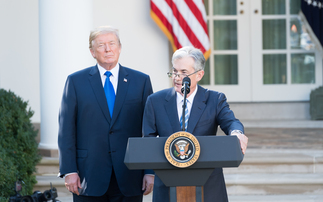
Matthew Murphy, MSIM
Trump Policies and their impact on Emerging Market Debt
We believe the overarching consequence on bond markets worldwide is a higher risk premium across all markets, yet the impact of the higher risk premium will affect some markets more so than others. U.S. Treasury and credit markets have suffered the most from the administration's policies and the associated risk premium is likely to remain elevated due to the unpredictability of future policy. Emerging markets bond markets will suffer or gain mostly based on their geography and trade dynamics with the United States: Asian countries with sizable trade surpluses with the U.S. are likely to be harmed the most, while markets in Latin America, ex. Mexico, developing Europe, the Middle East and Africa are likely to avoid much of the pain due to their limited trade. Yet, even within those regions, the potential consequences will differ country by country.
Considering the impact of U.S. policy across the risk factors that drive bond market performance is also helpful. In credit markets, the U.S. investment and non-investment grade markets began the year with very tight credit spreads, and now find themselves facing an uptick in defaults, especially near the lower end of the ratings spectrum. In contrast, most emerging markets entered the second quarter of 2025 with greater resilience to a shock and offer broad geographic diversification. The first half the 2020s was quite difficult for developing countries as the pandemic, two inflationary spikes and unprecedented tightening of developed markets monetary policy drove an uptick in sovereign debt defaults, currency devaluations and higher local rates. With much of that pain in the past, most countries now have the fiscal and monetary firepower to address an economic slowdown. Emerging markets corporates benefit in this uncertain environment as they mostly have lower debt levels and higher coverage ratios than their developed markets peers, as well mostly operate in sectors less sensitive to manufacturing and goods exports. And while the risk of lower oil prices remains a concern, most producers in the emerging markets have lower production costs than the U.S. and other developed markets producers.
Beyond credit markets, the impact of the U.S. administration's policies on emerging markets sovereign rates and currency could potentially usher in the bull market that has been so elusive for investors over the prior decade. It appears to us that the Trump administration cares much more about lower nominal Treasury yields this time relative to its obsession with U.S. stock market in the prior administration. This matters greatly for investors as the inflationary impacts of trade policy is likely to lead to lower, and potentially negative, real yields in the U.S. which will likely accelerate the capital flight from American shores. Most emerging markets countries enter this turmoil with high real rates and generally tight monetary policy, which gives them policy room to ease the pain of a slowdown. We think that most notably, the rise in the U.S. "policy premium", the likelihood of lower real rates and the expressed desire of the administration for weaker U.S. dollar relative to the currencies of its largest trading partners could spark a meaningful appreciation of emerging markets currencies across the globe.
Why Emerging Market Debt stands out as an investment opportunity today
Please recall the likely consequences shared in the prior answer: higher U.S. policy premium, high risk of defaults in credit markets, lower U.S. real rates, and weaker U.S. dollar. These factors combined with the relative strength of emerging markets corporate credit markets, strength of sovereign balance sheets, and scope for monetary policy easing might provide the opportunity for emerging markets debt offers greater strength relative to developed markets for the first time in over a decade.
Investors have generally avoided emerging markets debt during the period of "U.S. exceptionalism", yet that period is likely behind us, which provides greater support to the reasons why investors should always some allocation to emerging markets debt: improved diversification, enhanced returns and increased yields. Looking ahead, our view is that opportunities to diversify outside the U.S., participate in a decline in policy premiums and earn substantial cash flow along the way seems to be prevalent across the broad universe of emerging markets countries. As always though, individual country and corporate selection will the crucial factor in delivering those purported benefits.
What sets MSIM's Emerging Markets Debt Team apart
MSIM's Emerging Markets Debt Team ties its legacy back to 1984 with its roots at Eaton Vance – an investment manager acquired by Morgan Stanley in 2021. Over the decades, the team has successfully delivered competitive risk-adjusted returns across multiple strategies by utilizing three distinct, competitive advantages:
· Utilize the largest investment universe possible: The team's research efforts span over one-hundred countries, and evaluates investment opportunities across sovereign and corporate bonds, denominated in both domestic and hard currency.
Client benefits: often the first investor in a country's domestic market capturing a first-mover advantage; historically able to avoid most of the troubled countries and credits even when they are a heavy allocation in the benchmarks
· Focus on idea generation: A decentralized investment process empowers the team's risk-takers to focus on their respective regional coverage or investment specialty to research, develop, implement, and monitor their own individual investment ideas that ideally have a high probability of positive return and for which the estimated risk compensates for the expected return. These single investment opportunities are then used across the team's strategies as the primary driver of excess return.
Client benefits: full alignment of incentives between team members and clients' goals; meaningful reduction of key-person risk
· Capture operational alpha: A dedicated trading desk responsible for nearly every facet of trading from back to front office embraces the complexity of trading emerging markets currencies, bonds and associated derivatives. With an expressed goal of reducing transaction costs and improving liquidity via all means possible, the desk provides the team's risk takers all the possible tools with which to craft their investment ideas.
Client benefits: at no point in the investment process are the best interest of the client outsourced to a third party; repeatable, measurable alpha throughout a position's lifecycle.
A fifty-person team with a culture that believes the sum is always greater than the parts operates twenty-four hours a day, six days a week across three main offices (Boston, London, Singapore) delivering the benefits of those three distinct competitive advantages for over $20B in client capital.
Core principles behind MSIM's Emerging Market Debt strategies
MSIM's EMD strategies have three key features, consistent with the team's competitive advantages and culture:
· Capture full spectrum of opportunities: every country and anything in that country's debt capital market is eligible for inclusion regardless of benchmark inclusion/exclusion, with the intention to provide investors a blended (sovereign/corporate + domestic/hard currency), yet built entirely in a bottom-up fashion
· Isolate pure emerging markets debt exposure: hedge the developed markets risks that pervade emerging markets debt securities, notably U.S. duration risk in USD-denominated debt and the EURUSD exchange rate risk that resides in developing European currencies. By hedging these risks, the strategy has historically provided lower correlations to developed markets fixed income than competing blended strategies
· Align measure of success with intention: The team uses the strategy's Sharpe Ratio as a measure of success as that fully aligns with the mission to deliver all the benefits of EMD in the most risk-aware manner possible, with information ratio as a close second measure of success as the team wishes to know it has truly earned the fee it charges for active management
The views and opinions are those of the author as of the date of publication and are subject to change at any time due to market or economic conditions and may not necessarily come to pass. Past performance does not guarantee future results.
This material is a general communication, which is not impartial and all information provided has been prepared solely for informational and educational purposes and does not constitute an offer or a recommendation to buy or sell any particular security or to adopt any specific investment strategy. Investors should seek independent legal and financial advice, including advice as to tax consequences, before making any investment decision.
This material has been issued by any one or more of the following entities:
EMEA - This material is for Professional Clients/Accredited Investors only.
Outside the EU, MSIM materials are issued by Morgan Stanley Investment Management Limited (MSIM Ltd) is authorised and regulated by the Financial Conduct Authority. Registered in England. Registered No. 1981121. Registered Office: 25 Cabot Square, Canary Wharf, London E14 4QA.
RO 4485910 Exp. 08/05/2026













